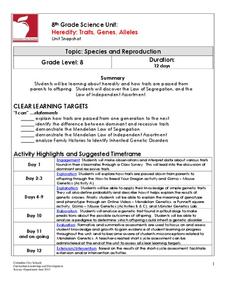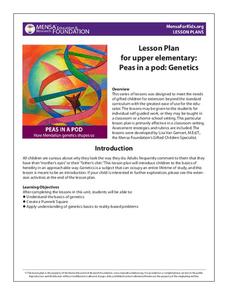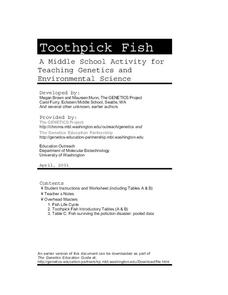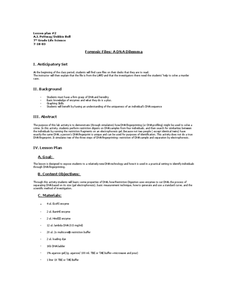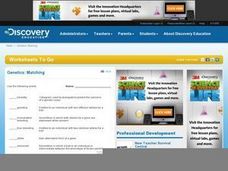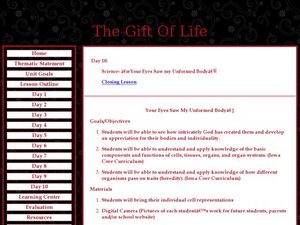Columbus City Schools
Let’s Get Theoretical About Cells
Get up close and personal with cells in a hands-on journey to discover what makes up living things. Scholars learn valuable microscope skills, delve into the Modern Cell Theory, and gain insight into how cells reproduce. The included lab...
Columbus City Schools
Heredity: Traits, Genes, Alleles
If you knew people would pay extra for a bald dragon, could you pick which parents you should breed in order to get the highest number? The unit examines heredity and genetics through breeding dragons, mice, dogs, and tries to figure...
Teach Engineering
The Grand Challenge: Fix the Hip Challenge
It may be time to get to know the skeletons in your family. The first instructional activity in a series of 5, introduces the class to the concept of osteoporosis. The class members brainstorm possible causes and whether the family...
MENSA Education & Research Foundation
Peas in a Pod: Genetics
Can peas have grandparents? Learn about inherited traits and heredity with a set of activities focused on Mendelian genetics. As your class learns about the process of passing traits along in Punnett squares, they take on the role of...
It's About Time
Is It Heredity or the Environment?
Himalayan rabbits are black when raised at low temperatures and white when raised at high temperatures. Young biologists participate in an experiment using seeds to demonstrate the ways the environment can influence an inherited...
Virginia Department of Education
Passing Traits to Offspring
What makes each one of us unique? Lead your class in this exciting and educational activity as you uncover traits that show how each individual is different from another. Pupils explore facts about DNA technology and predict the...
University of Colorado
Punnett Squares with Piebald Deer
Explore the science behind Earth's amazing diversity of life with this lesson plan on genetics. Looking at specific traits in piebald deer, carnations, and roan cattle, young scientists use Punnett squares to determine the possible...
US National Library of Medicine
Monster Genetics Lab
Harness young scientists' knowledge of genetics with an engaging science activity. Students start by flipping a coin to determine the genotypes and phenotypes of two parent monsters, before using Punnett squares to determine the...
Oklahoma State University
Hairy Heredity
Young scholars learn that heredity comes down to the flip of a coin with this cross-curricular math and science lesson. Using smiley faces as a model, students toss coins to determine which dominant or recessive traits will be passed on...
Cherokee County Schools
Dragon Genetics
It's alive! Turn young biologists into mad scientists with this engaging genetics activity. Using their knowledge of chromosomes and genes, high schoolers create dragons with unique sets of traits, eventually breeding them to make a new...
Curated OER
DNA Extraction
Students discover the basic structure of DNA and its function in living organisms by conducting an experiment in which they extract DNA from bananas using a lysis buffer solution.
Curated OER
Genetics Practice 3: Probability Practice
Practice calculating genetic probability, listing gametes, and identifying genotypes. The worksheet combines short answer questions with practice problems to solve. It would make a revealing review assignment or even a practical pop quiz...
Curated OER
Genes within Populations
Finally, here is a genetics activity that does not include Punnett squares! Designed for a more advanced class, biology learners will compare Lamarck's concept of evolution with Darwin's. They will explore the Hardy-Weinberg equilibrium...
Curated OER
Mendel's Laws of Heredity
Easy-to-read notes about Mendel's Laws of Heredity make up this collection of slides. In bullet-point style, viewers are exposed to Mendel's pea plant experimentation and the rules he developed that govern genetics. There are no graphics...
Curated OER
Families and Heredity
Personality traits and physical appearance traits within families are the focus here. Learners make a poster which lists the shared physical traits they have with their family. Peers look at each poster and write down the traits they see...
Curated OER
Science Jeopardy
Wow! Review an entire semester of biology curriculum playing this Science Jeopardy game! The variety of topics is extremely broad, so you will need to review each question to find if they all apply to your course. As you find material...
Curated OER
genetics
Parts of the cell as well as genetic material begin this presentation. As the slides continue, there are explanations of the main terms used in genetics. The structure of genetic material, chromosomes, and replication are summarized....
University of Washington
Toothpick Fish
With colored toothpicks representing genes, youngsters practice passing them through generations of fish and learn about heredity. Consider this as an introductory activity since it does not represent recessive genes with lowercase...
Curated OER
Forensic Files: A DNA Dilemma
Seventh-graders come in to science class to find a file on their desks detailing a crime to be solved! As a demonstration, you simulate the restriction of DNA samples and separate them by electrophoresis. From the gel, learners can...
Curated OER
Inherited Traits
Young scholars work with a partner to complete an inventory of their traits and compare and discuss their unique qualities. In this biology instructional activity, students determine percentages for the frequency of observed traits of...
Curated OER
Genetics Matching Worksheet
Twenty-one genetics vocabulary terms are listed down the left side of the learning exercise and numbered definitions in another column. Pupils match the definitions to the terms. A link to the answer key is provided. Where the content is...
Curated OER
Your Eyes Saw My Unformed Body: closing lesson
For those who teach and believe in Intelligent Design, this lesson is perfect. Religion students read and discuss Psalm 139: 1-18, and present their cell representation in class. They then watch a speech by Louie Giglio about the protein...
Curated OER
Look Alikes
Third graders compare and contrast the physical features of parents and offspring. For this life science lesson, 3rd graders classify a set of animal pictures according to their similarities. They share and explain their work in class.
Curated OER
Parental Genes
Eighth graders explore how different organisms pass their traits to their offspring. In this life science lesson, 8th graders differentiate recessive and dominant alleles. They predict the phenotype based on the genotype of an organism.



